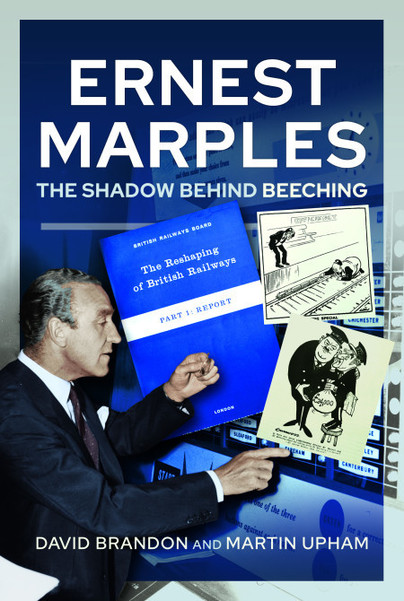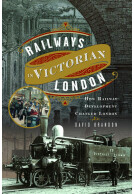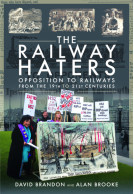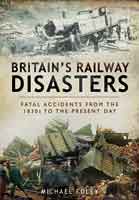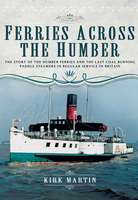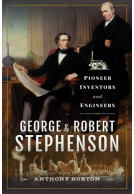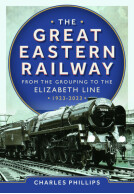Ernest Marples (ePub)
The Shadow Behind Beeching
Imprint: Pen & Sword Transport
File Size: 25.9 MB (.epub)
ISBN: 9781526760197
Published: 30th January 2022
| Other formats available - Buy the Hardback and get the eBook for £1.99! | Price |
|---|---|
| Ernest Marples Hardback Add to Basket | £25.00 |
Ernest Marples revolutionised three UK government departments. At Transport (1959-1964) he appointed Dr Beeching chairman of British Railways and commissioned him to produce his infamous report, inaugurated motorways and introduced significant regulations for motorists. At Housing (1951-1954) he delivered 300,000 new houses annually and as Postmaster General (1957-1959), he reformed Post Office accounting systems and launched postcodes and Subscriber Trunk Dialling. This first biography of Marples uses newly-available archives to examine public and private transport policy, the growing power of the pro-road lobby and the identification of personal freedom with driving. Railway sentimentalism was no match for these.
Marples was lucky not to be implicated in the Profumo Affair which rocked the Conservative Party but his political career was over soon afterwards. Questionable business practices caused his 1975 flight to Monaco hotly pursued by the Inland Revenue. Beeching, unhappy under a Labour government, returned to private industry although he later chaired a Royal Commission. Labour, despite promises, proved little friendlier to the railways but a more positive approach to loss-making passenger services eventually emerged under Barbara Castle.
This book should appeal to those interested in Britain's railways and in mid-Twentieth Century British politics.
This is an excellent biography and I very much enjoyed it.
NetGalley, Mandy Jenkinson
Many railway enthusiasts would assert that the man who hired Dr Beeching to write his infamous report would have a lot to answer for. Ernest Marples was appointed Minister for Transport in 1959, after revolutionising the Post Office (introducing the Postcode system amongst other innovations). Beeching’s appointment and Marples’ penchant for road building would be controversial enough, but questionable business practices and his later abscondment to Monaco to evade a hefty tax bill did little to rescue his reputation. This is an interesting book for anyone interested in both the early BR era and post-war British politics in general.
Model Rail Magazine
This book gives quite a lot of Marples’ personal story but also goes into quite some depth on the background of the railways at this time.
Mercedes Benz Club
If you have an interest in modern history and a concern for how our roads and railways have been managed, you will find this a very worthwhile read.
A fascinating account of the career of the man who was the Minister of Transport who instigated the Beeching Report. The book does not sensationalise his connection with civil engineering company, Marples Ridgeway, but follows his time at Housing the Post Office, then Transport, as the railways seem to have taken a back seat to roads. The background to transport policy in the post-war years is most interesting
Vintage Road Scene
As featured in
Highland Railway Journal, Autumn 2022
It is surprising that Ernest Marples, from 1959 to 1964 the longest serving transport minister, has never been the subject of a biography It is good therefore that Pen & Sword has published the work of David Brandon and Mark Upham. It is also good that Pen & Sword continue to identify interesting subjects while their commissioning agents seem to have a knack of finding fascinating new people to write about.
Backtrack Magazine
The authors were fortunate in being able to make good use of his diaries and other personal papers – over thirty boxes – at Churchill College, Cambridge. They also used other primary sources in the Post Office and National Archives.
This is a good piece of work.
For anyone who wants to understand why the British railway system was transformed in the 1960s, this book is highly recommended.
Rail Advert
Score: 4.9 out of 5
Read the full review here
"The work fulfils a vital role. It fills an important vacancy on the shelves of those interested in post-war politics, ministerial biographies and life writing, and transformational processes in transport and industrial history. Furthermore, it restores the significance of a towering figure in post-war Conservative politics to their rightful place. Ernest Marples is too consequential a figure for his career to be judged on his favouring of roads over railways and end of career tax avoidance. Frankly, he is too interesting for that. Where he came from, how he got to those positions of power, and what he achieved are far more significant."
Transactions of the Historic Society of Lancashire and Cheshire
It is surprising that Ernest Marples, from 1959 to 1964 the longest serving transport minister, has never been the subject of a biography It is good therefore that Pen & Sword has published the work of David Brandon and Mark Upham. It is also good that Pen & Sword continue to identify interesting subjects while their commissioning agents seem to have a knack of finding fascinating new people to write about.
Railway and Canal Historical Society Journal
In this case, they have endeavoured to present their subject in an objective way, warts and all, without being tempted to the sensational. They revealed that from humble beginnings, Marples became a man of substance by 1938 through property dealing, albeit with the support of an older business friend. Unfortunately he is only remembered by many for his introduction of parking controls, railway closures and questionable business practices which culminated in a midnight flit to Monaco on the Night Ferry in 1975 to escape the taxman.
The authors revealed that there was much more to the man. He oversaw the expansion of post-war house building, the introduction of telephone Subscriber Trunk Dialling, Premium Bonds, traffic wardens, parking meters, drink driving controls and motorways. On the railway side, he dismantled the British Transport Commission with its replacement by amongst others the British Railways Board under the chairmanship of Dr Beeching who they noted was not initially enthusiastic about electrification. At one stage, he was seen as a rising star while a Prime Minister later wrote of him as a man of outstanding loyalty, great ingenuity and untiring energy.
The authors were fortunate in being able to make good use of his diaries and other personal papers – over thirty boxes – at Churchill College, Cambridge. They also used other primary sources in the Post Office and National Archives.
This is a good piece of work.
Marples lived a colourful life, and this excellent book tells the whole story – not just the Beeching/motorway episode, but the equally eventful periods either side. Recommended.
A to B magazine
Article featured in
Islington Tribune
As featured in:
Westminster Journal
Article: 'Axe of Desperation'
Camden New Journal
As featured in
Rail
Part political biography, part railway history this is the first book to examine the life of the man who appointed Doctor Richard Beeching to make recommendations on the future of British Railways. As such it is a valuable work and surprising that no-one has attempted a biography of this controversial politician before.
Friends of the NRM
A book for those interested in the politics behind railways this forms a balanced and well researched life of a man whose promise was never quite fulfilled.
Was REVIEW OF THE MONTH
Steam World - March 2022
Book Competition as featured in:
Rail
Brandon and Upham’s fresh review shows all sides of a complex man who might well have been a politician before his time. They give the pros, the cons and enough evidence for readers to make up their own minds. Their fine work redresses the imbalance in our history that has focused on Beeching alone for too long.
Rail Magazine - February 2022
Rating: 5 out of 5 stars
NetGalley, Chris Hallam
The importance of being Ernest? Well over forty years after his death in 1978, post-war Tory Transport minister, Ernest Marples remains a deeply controversial figure.. Emerging initially as a relatively dynamic, young thrusting politician in the comparatively placid world of 1950s Conservative politics, today there are more than a few clouds over his character namely the apparent conflict of interest between his pro-car transport reforms and personal business interests, his tax exile and his penchant for being whipped while wearing women's clothes.
But these aren't even the most controversial things about him as he is strongly associated with Lord Beeching whose 'reforms' devastated the British railway industry. in the 1960s. David Brandon and Martin Upham's extremely thorough biography covers both the details of Marples' own life while also thoroughly exploring the history of the transport network and providing a context for Marple's controversial decisions.
Everyone interested in railways has heard of Dr Richard Beeching, whose 1963 report, ‘The Reshaping of British Railways’, recommended the closure of a significant proportion of the UK’s rail network. Any discussion of the report can arouse strong emotions: was Beeching a villain who took away the train-set (that nobody used) or a hero who forced British Rail to think about profitability?
Colin Edwards
The Transport Minister who employed Beeching and set his remit was Ernest Marples. It’s worth emphasising that Beeching did not close any lines or any stations. As he was asked to do, he Identified which railway activities were profitable; which were unprofitable; and what actions would stem BR’s losses. It was the minister who made the decisions: initially Marples and then, after the Labour party won the 1964 general election, Tom Fraser (for 14 months) and Barbara Castle. Astonishingly, there has been no biography of Ernest Marples until now, yet Marples introduced measures that still affect us today, in his role as Transport Minister and his earlier positions as Postmaster General and junior Housing Minister under Harold McMillan:
- The reduction of Britain’s railway network
- Traffic wardens
- The breathalyser
- 70mph speed limit
- Premium Bonds
- Post Office savings accounts
- STD (Subscriber Trunk Dialling) phone calls
- postcodes
Although this portion of this book by Martin Upham and David Brandon draws heavily (and unsurprisingly) upon Terry Gourvish’s and Charles Loft’s earlier work, it has a highly readable and succinct explanation of events. It’s very much a book by two authors with different styles: the first six chapters cover Marples’ life and career prior to his promotion to Transport Minister in 1959. While the material is sound, the style is frustrating: I lost count of how many times we’re given a digressive preview of the future, e.g. early in a discussion of housing 1951-1954, we’re told about Marples’ successor in 1959 and a triumvirate in power during the 1960s before reverting to events of 1951; and in 1958, “While the longed-for Post Office Tower would not be built on his watch, […]”
The next block of ten chapters explains why road and rail transport both required change by the late 1950s; how Beeching addressed these issues; and the consequential impact upon Britain’s transport system. This section is excellent and far from dry. It quotes an MP, “[…] use Dr Beeching’s face cream because it removes lines.” It shows that Beeching’s recommendations were a logical response to the financial situation and based upon evidence, although the methodology for gathering that evidence may have been questionable. As the authors state, Beeching’s proposals continued a series of closures that started many years before his appointment: between 1950 and 1962, over 300 branch lines had already closed and 174,000 railway jobs had gone. “While large numbers of people had a sentimental attachment to the railways, this did not necessarily extend to using them.”
A final chapter covers Marples’ life from his poor relationship with McMillan’s successor, Ted Heath, until his death in 1978.
If you want to understand why our railway system was transformed in the 1960s, I cannot recommend this book highly enough.
About David Brandon
David Brandon lectured in modern British social and cultural history at several British universities and has written extensively on railways and London history. He has also given many public talks on both subjects.
About Martin Upham
Martin Upham is the author of Britain Explained (2017, revised 2020), editor of A Visitor’s Britain (2000) and numerous reference books including Trades Unions of the World (1993). He holds degrees from Manchester, Bristol and Hull universities. While in Hull he contributed to early volumes of the Dictionary of Labour Biography. He was director of AHA International (London campus of the University of Oregon, now GEO London), 2004-14. During 1975-88 he was Research Officer of the Iron and Steel Trades Confederation and a member of the OECD iron and steel working party.







